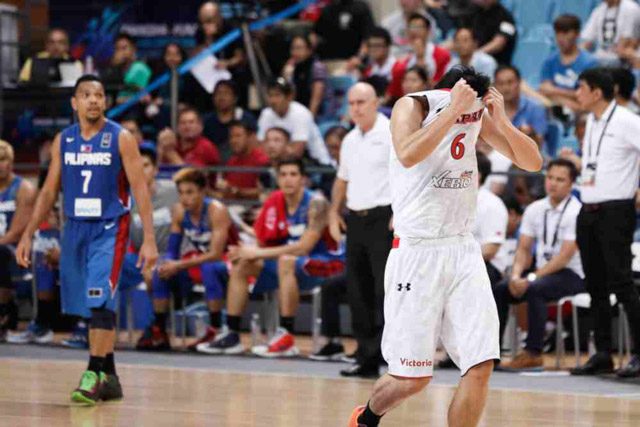SUMMARY
This is AI generated summarization, which may have errors. For context, always refer to the full article.

MANILA, Philippines – The Philippines, for all its kicking butt and taking names so far in the 2015 FIBA Asia Championship, knows that it hasn’t really done anything yet.
The minimum goal is to replicate the accomplishment of 2013 — a silver medal. While all 4 semifinalists are assured of an Olympic wild card berth, the gold medalist is assured of an outright ticket to the 2016 Rio Games.
When Japan played the Philippines at the start of the second round of the 2015 FIBA Asia, the Filipinos were still groping for form. Japan took an early lead, but once the Philippines overhauled it they held off their Asian rivals for a 73-66 victory.
Since that game, the Philippines has found its form and defeated in impressive fashion defending champion Iran, showed it has plenty of energy in reserve in outlasting India, and in topping Lebanon.
Now they face Japan once again on Friday, October 2 (10 pm) in the semifinals.
Japan, who are themselves in the midst of a basketball renaissance, have won 5 of 7 matches, already improving from its 2013 performance where they finished at the ninth spot with a dismal 3-4 record. Incredibly, they are playing without any naturalized player.
(BOOKMARK AND FOLLOW: LIVE BLOG: Gilas vs Japan – 2015 FIBA Asia semifinals)
They will be up against the tournament’s second most prolific duo in Andray Blatche and Jayson Castro (Palestine’s 1-2 punch of Sani Sakanini and Jamal Abu Shamala are tops with a 44.1 scoring average) who have combined for 34.7 points per game.
What Japan did to stay within striking distance against the Philippines was to rebound (43-37 rebounding edge) and to find the open man (12-7 assists edge). What they need to correct are their turnovers (15-8) and fouls (25-15) that led to 28 free throws awarded to the Filipinos. In contrast, Japan went to the 15-foot line only 10 times. The Japanese did a poor job in protecting the ball as the Philippines picked their pockets 8 times (Japan only had 3 steals) which led to nine fastbreak points.
If Japan wants to pull out a shocker they will have to take care of that ball and play defense. They will need center/power forward Joji Takeuchi to play better in the slot. He is averaging 15.7 points and 11.6 rebounds. He scored two points less against the Philippines because of the terrific defense on him that allowed him only 9 field goal attempts.
How can your leading scorer only get 9 field goal attempts?
Coach Kenji Hasegawa should devise a way to get him more shots and to try and take it to the Filipinos inside.
Both teams in their second round match up each had 28 points in the lane. Bench scoring was almost even 23-25, for the Philippines. As previously mentioned, it was the free throws and fastbreak points allowed that hurt Japan. Aside from Takeuchi and Makoto Hiejima who scored 17 against the Filipinos, they will need that third scorer to balance out the Philippines’ frightening triumvirate of Andray Blatche-Jayson Castro-Terrence Romeo.
That should be Takatoshi Furukawa who averages 11.3 points a game but was held to 7 in the match against the Filipinos.

For the Philippines to win, they will need their Dynamic Duo to remain impervious with a lot of support from their third best scorer in Terrence Romeo who has averaged 14.0 points in 7 matches. They will need some support inside the lane when Blatche goes to the bench for some rest.
Marc Pingris answered that call in the fourth quarter providing much needed rebounding and inside scoring.
Early in the game against Lebanon, the shaded lane was like a layup line for the Philippines. Castro led the charge with 3 scintillating drives that carved the matador defense of the Lebanese. In the second quarter, Blatche, Romeo, and Calvin Abueva began to attack the interior as well.
What makes the Philippine juggernaut worth watching is how — after that opening day loss to Palestine — get better as the game goes on. The Filipinos average 43.0 points in the first half to the 33.0 of the opposition. Their finishing kick is better as they score 46.2 points in the second half while holding down the opponent to 34.0 points.
What’s at stake?
Should the Philippines defeat Japan they will either play Iran or China in the final on Saturday, October 3.
China has been overlooked with all the noise of the Filipinos, Iran, Palestine, Japan, and India have made. They like it that way, gliding into the semifinals like a shark, the last unbeaten team of the tourney with a 7-0 record.
If you looked at the Philippine program since 2008, its ranking has gone up — fourth in 2011 to second in 2013. In 2013, there was that huge win over South Korea. In this tournament, that massive win was won over Iran.
With South Korea out of the way, there are 3 other Asian rivals who are in the way — Japan, Iran and China. If the Philippines wants to realize its Olympic dreams then they have to take two of them down. – Rappler.com
Add a comment
How does this make you feel?
There are no comments yet. Add your comment to start the conversation.